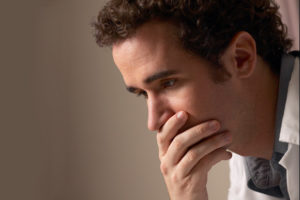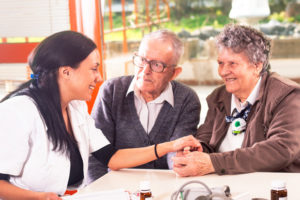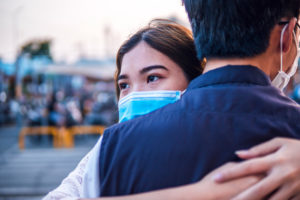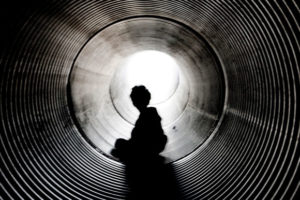February 18th, 2021
The Human Side of Medicine — Grieving the Loss of Our Patients
Masood Pasha Syed, MBBS
“The life of the dead is placed in the memories of the living” — Marcus Tullius Cicero
Growing up in a family of physicians, I was exposed early to healthcare from the provider side. Some days, my father would come home late after a long surgery with an unanticipated complication or an unexpected outcome and would silently eat his dinner while listening to us talk about how our day went. As an animated child, I always had many things to tell him, but I realize that I never asked him how his day had gone. Throughout my career though, I have come to realize the power of being comfortably silent with your loved ones. We all need that unique outlet to destress, and now I understand that it was his family for my dad.

Losing patients is never easy — the permanence of loss with death highlights our lives’ temporary nature. Having been trained to save lives and treat diseases to help cure our patients, it is challenging to deal with loss emotionally, physically, and intellectually.
The ongoing pandemic has definitely tilted this equation even more and has left most of us with hardly any time to truly internalize and reflect on losing patients. It has been surge after surge, with the continuous onslaught of COVID-19. Fortunately, one of the success stories of this decade will be the vaccine and its role in reducing the number of deaths, provided we reach an adequate number of vaccinated individuals. Politics and conspiracy theories aside, we must not forget the power of science and choose it over our own personal differences with each other’s thought processes. As we start seeing the beginning of the pandemic’s end, the road to recovery will be a long one ahead. We need to continue planning the rollout of vaccines, including mass production and administration to the general public, consider our response to the newer viral strains, and, at the same time, address the loss we all have seen so far. I think it is high time to restart (continue) the conversation about physician grief and better ways to deal with it.
 Dealing with a patient’s death is a profoundly personal experience, and coping mechanisms will vary. Although our ways of dealing with adverse outcomes may differ from each other, there is a root paradox with confronting death, since it negates everything we are taught and inclined to do — be it saving lives or curing diseases. Acknowledging this paradox can be a valuable starting point, as we learn to recognize our own feelings and patterns of dealing with loss. Some insightful pointers that I have received from my mentors are these:
Dealing with a patient’s death is a profoundly personal experience, and coping mechanisms will vary. Although our ways of dealing with adverse outcomes may differ from each other, there is a root paradox with confronting death, since it negates everything we are taught and inclined to do — be it saving lives or curing diseases. Acknowledging this paradox can be a valuable starting point, as we learn to recognize our own feelings and patterns of dealing with loss. Some insightful pointers that I have received from my mentors are these:
 Honesty and Empathy: Being completely honest with our patients and their families is vital and goes a long way in overcoming their fear and uncertainty. Prioritizing their comfort is essential and helps address common goals. Choose a private area to communicate bad news and express sincere empathy. Always ask if anything else can be done to help families with the grieving process. We often learn how to be better in these trying times by listening to what families have to say.
Honesty and Empathy: Being completely honest with our patients and their families is vital and goes a long way in overcoming their fear and uncertainty. Prioritizing their comfort is essential and helps address common goals. Choose a private area to communicate bad news and express sincere empathy. Always ask if anything else can be done to help families with the grieving process. We often learn how to be better in these trying times by listening to what families have to say.
- The power of choice (letting go of guilt): Remember that it was our choice to be here in this role, caring for patients. We must not forget our conviction for helping others and reducing suffering, which led us to medicine. Refreshing our perspective regularly helps us realize how far we have come, while we continue to learn from our ongoing experiences. Unfortunately, medicine is not an exact science. Sometimes, practicing it can be an art, especially while traversing through some grey areas. Being comfortable with not knowing it all makes us human. Setting ourselves on a path where only saving lives is acceptable may not be an ideal goal; instead, focusing on respecting patients’ autonomy and wishes will help us see life and death as more than success and failure.
 Seek support and normalize grief by creating a safe space: Physicians are not superheroes and cannot fix everything. One of my mentors uses the “Magic Wand” analogy and tells her patients that she would surely fix everything if she had a magic wand. Unfortunately, none of us have one. I have found that being honest about my inability to fix everything is very powerful during patient encounters. I have seen it humanize physicians. Remember, it is okay to cry with your patient’s family, and it does not make you a weak person or any less of a doctor. Showing your emotions in such a situation helps physicians and patient families grieve together and achieve closure. It also helps to talk about losing patients among peers in a supervised setting and perhaps with professional psychologists present, if needed. It also helps to listen to your colleagues’ experiences. Creating safe spaces at work on a regular basis can definitely be therapeutic. We are a team, through life and through death.
Seek support and normalize grief by creating a safe space: Physicians are not superheroes and cannot fix everything. One of my mentors uses the “Magic Wand” analogy and tells her patients that she would surely fix everything if she had a magic wand. Unfortunately, none of us have one. I have found that being honest about my inability to fix everything is very powerful during patient encounters. I have seen it humanize physicians. Remember, it is okay to cry with your patient’s family, and it does not make you a weak person or any less of a doctor. Showing your emotions in such a situation helps physicians and patient families grieve together and achieve closure. It also helps to talk about losing patients among peers in a supervised setting and perhaps with professional psychologists present, if needed. It also helps to listen to your colleagues’ experiences. Creating safe spaces at work on a regular basis can definitely be therapeutic. We are a team, through life and through death.- Gratitude and prioritizing self-care: Being thankful to the people who care for us and the blessings we have can be very powerful and definitely can add meaning and purpose to our lives. Caring for others can continue to be fruitful only when you begin with yourself. Practicing personal wellness regularly results in professional wellness. Finding a hobby and doing something you genuinely enjoy outside of medicine helps heal your body, mind, and soul.
To conclude, any new disease will always bring with it its own uncertainties. Although we have had coronavirus infections before, we have never had them at such a pandemic proportion. This has resulted from many factors, the scope of which is beyond this blog piece but, needless to say, we have many things to unwrap in the time that lies ahead. Not knowing the natural history of a disease and the pathogenesis of its symptoms made many of us feel like we were stuck in a tunnel, blinded by its darkness, trying  to find a way out.
to find a way out.
How can we treat a disease we do not fully understand? As we answer this question, I am appreciating the power of fundamental principles and basic research with all the developing literature. I thank all the great scientific minds and the gallant efforts of our healthcare workers/allied staff members as we even begin to see the light, hopefully, at the end of this tunnel.
I invite the readers to share their experiences with grieving through this pandemic to continue this narrative and help with the healing process.




thank you Dr. Syed for you warm words and strengthening insights. i take your suggestion to care for myself and colleages at work so we can get through these very tough times at our best, for our sakes and our loved ones. in my practice in Israel we fight the same fight you do in the states. our globe has become a small marble, our similarities hold us together.
Dear Dr. GalEzer,
Thank you for sharing this with me and for your feedback. You are absolutely right – our world has indeed become a small marble – adversities make us realize and appreciate all that truly matters. May you find the strength to continue the fight against COVID 19 and hoping for things to settle down at your end soon. Stay safe!